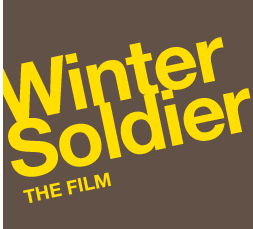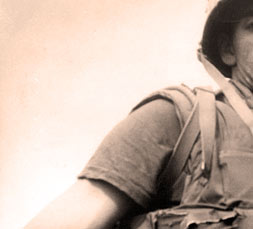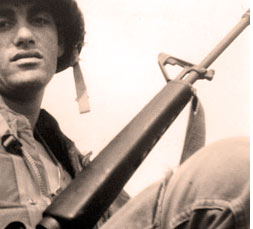|
 |
 |
 |
|||
|
The Truth About Vietnam
Hartford Advocate, September 22, 2005 In 1971, a group of American Vietnam veterans told the truth about what they did in Vietnam. Their testimony is at long last seeing the light of day, in the documentary Winter Soldier. Of all the young Vietnam vets in Winter Soldier, it is Scott Camil who is the most unforgettable. In the crisp black and white film of 1971, his eyes shine. His face is gentle, seraphic, as he talks about what he did as a U.S. Marine in Vietnam. "If I had to go into a village and kill 150 people just to make sure there was no one there to kill me when we walked out, that's what I did," he says. He smiles, with what seems to a be a strange mixture of wonder and relief, as the atrocities mount up. And there are the grim jokes that are told time and time again. When a Vietnamese civilian gets killed, he's counted as a VC kill. "How do you know he's VC?" the soldiers are asked. "Because he's dead," is the standard reply. Then there's Rusty Sachs, a former Marine helicopter pilot who also wears a bemused smile as he talks about prisoners being thrown out of his aircraft. You don't count prisoners when they get loaded on the chopper, he explains, but only when they get unloaded, because, "the numbers may not jibe." On his first day in Vietnam, one Marine named Bangert was riding a truck to a base. When a group of children give the marines on the truck the finger, the truck "slowed down a bit," Bangert recalls. "The guys got up, including the lieutenant, and just blew all the kids away ... That was my first day in Vietnam." Bangert later describes the scene as a USAID officer takes a dead woman in a village, disembowels her and skins her, as a message to the village, "a sign of something or other." There is no turning away from Winter Soldier, a filmed documentary about a group of hearings in Detroit in 1971, when 109 veterans gave testimony about war crimes, an event sponsored by Vietnam Veterans Against the War. There is nothing fancy about the film. Just a bunch of very young men with long hair and beards talking about what went on. At the time, a group of young filmmakers who opposed the war decided to make the film, using borrowed equipment. They did so anonymously. Although the hearings were covered by major news media, very little of the reporting saw the light of day. The film itself was aired in only a few places and went more or less underground until now. One of the figures who makes a very brief appearance, is John Kerry. It isn't a particularly flattering appearance, but thanks to his presence you can find all kinds of websites that will tell you that most of the testimony in the film is questionable, that some of the witnesses lied about who they were, and so on. It is staggering the degree to which people will go for political purposes. Whatever. The organizers of the event did check the authenticity of each vet's service record, and each witness was required to bring their discharge papers. Obviously, the film has particular resonance at this moment, with the U.S. in Iraq. What these Vietnam-era soldiers attest to is a culture inside the military where senior officers allowed atrocities to take place. I'm going to hope that there is more discipline now. Regardless, the stories told here are the stories of every war. Men are degraded to where they will murder for pleasure. One puzzled vet recalls that he and his friends threw large rocks at a child who taunted them. "Some of us stoned this child to death for a laugh because we were bored that day," he says, puzzled. |
MORE REVIEWS
When We Were Psychos
Casualties of War
Eat the Document |
||||
|
|||||